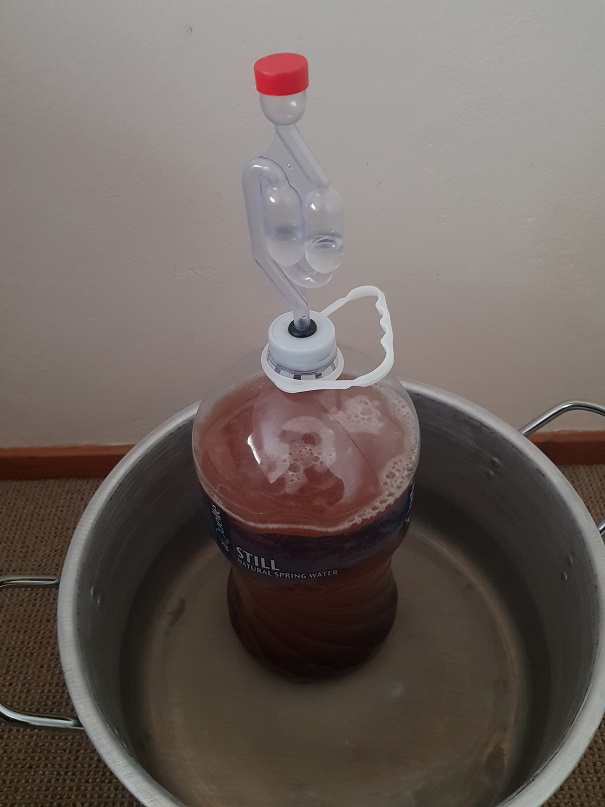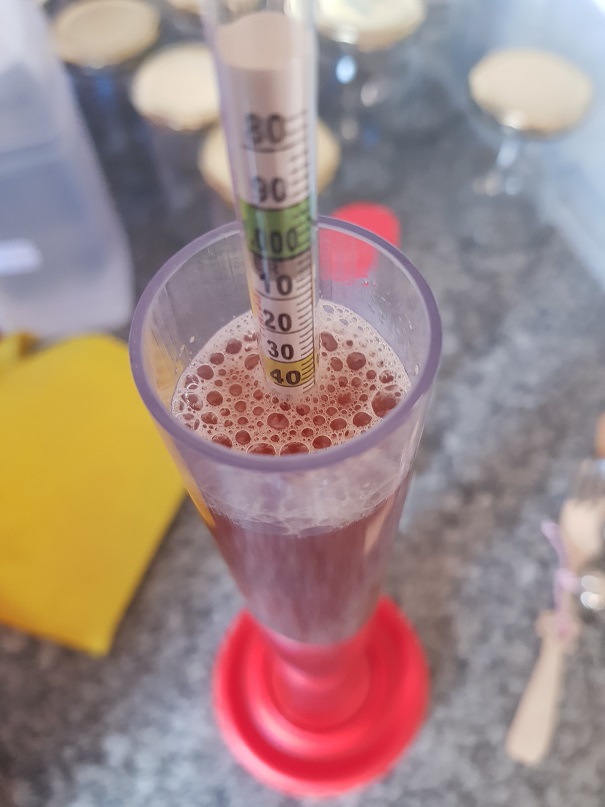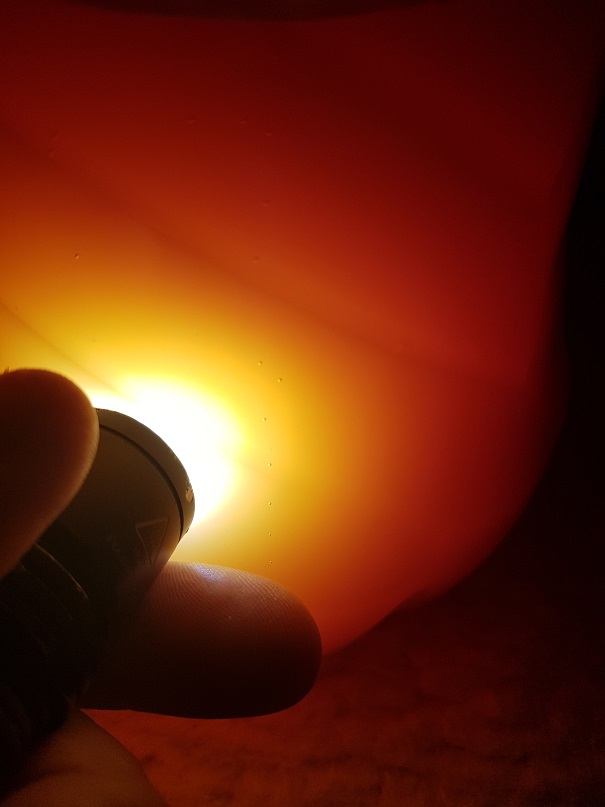Toxxyc
New and loving it
Good morning ladies and gents,
In an attempt to flog the dead horse myself, herewith another thread on this topic. I'm sorry, you must be sick of it by now, but I can't find the specific info I'm looking for by just searching. So, let me begin with a story...
A few weeks ago I had a weird dream. Yes, I know how it sounds, but I'm not a crystal ball type guy who believes in star futures and fairies and ****. Anyway, to the dream. In the dream I had, a buddy's home brew stuff was stolen (which wouldn't be uncommon here in South Africa), and his mother approached me for advice on what to get him to get him back to brewing. As I showed her my fermentation chamber, I saw a red brew in there. Picked one up and according to myself in the dream, it was a "Rooibos Cider".
Now, to those who don't know Rooibos, it's a type of tea that's native to South Africa and has a pretty definitive flavour. It's called "rooibos" and literally translates to "red bush" in English. It creates a deep, almost rusty-coloured red tea with a delicate flavour.
And back to the cider - when I woke up, the idea was born and I made a note as to not forget it. I want to make a Rooibos Cider. Bright red in colour, if possible, around 5% ABV and with a good Rooibos flavour. So the plans started.
I searched around for options on juice, and found no fresh pressed or squeezed juices in my area. It's just not available, it seems. I also don't intend on spending half my salary on apples to squeeze to make just one batch of cider, so I started looking at other options. I looked for cider kits, since I know they come with juice concentrates, and saw what those kits cost. It's a no-no if I want just part of the kit, so I started searching for the concentrates the kits used.
Unable to find quantities less than 50l concentrate drums (which is used to make around 1,000l of juice at a time), I started looking for more plain pure concentrates. I then found a manufacturer who makes 100% pure juice concentrates, without any other additives like sucrose or other fruits that's not disclosed. I also noticed they have preservatives added. The Apple juice I got contains Potassium Metabisulfite and Potassium Sorbate. The Cranberry juice contains Potassium Sorbate and Sodium Benzoate, along with some other things I don't worry about like citric acid.
So, I don't worry about the k-meta. I know it'll dissipate after dilution with even a little bit of time, so on to the next one. Sorbate I can apparently overcome with a large yeast colony, and here I have a plan (later on this). It's the benzoate I'm a bit more worried about. From what I understand it has the same effect as sorbate, so if I can beat the sorbate I should be able to beat the benzoate as well, correct?
On the bottles they do mention if I dilute the juices it should be kept in the fridge to "prevent spoilage", so obviously it's not immune to infection after dilution. That's a good sign.
Finally, I've asked for the spec sheet on they amount added to the concentrate on production. If it's low enough, I can probably ignore the preservatives and just ferment through it, but I'm erring on the side of caution that it won't be that low.
And herewith my two questions:
1. Can I get rid of the preservatives using a simple, easy method, or is this not possible?
2. If #1 is not possible, what yeasts should I look for that might be able to overpower the preservatives? I'm aware that I'll probably have to build a large starter to pitch, but would something like a kveik yeast not be a great idea to try here? I have no quarrels feeding the yeast with all the required stuff should I opt to just pitch straight into the dissolved concentrates...
My method would be pretty simple - make a large amount of Rooibos tea, maybe even directly into the fermenter. Add some concentrate and add sugars to boost ABV to the required levels. Idea is to dissolve the juice concentrates to past where they are considered "drinkable" because the flavours are too strong there, further dissolving the preservatives and all that.
So yeah, just my questions. If it's not worth it, I'll just forget this idea and buy a kit sometime, but I'm hoping that I can make it work with this concentrates...
In an attempt to flog the dead horse myself, herewith another thread on this topic. I'm sorry, you must be sick of it by now, but I can't find the specific info I'm looking for by just searching. So, let me begin with a story...
A few weeks ago I had a weird dream. Yes, I know how it sounds, but I'm not a crystal ball type guy who believes in star futures and fairies and ****. Anyway, to the dream. In the dream I had, a buddy's home brew stuff was stolen (which wouldn't be uncommon here in South Africa), and his mother approached me for advice on what to get him to get him back to brewing. As I showed her my fermentation chamber, I saw a red brew in there. Picked one up and according to myself in the dream, it was a "Rooibos Cider".
Now, to those who don't know Rooibos, it's a type of tea that's native to South Africa and has a pretty definitive flavour. It's called "rooibos" and literally translates to "red bush" in English. It creates a deep, almost rusty-coloured red tea with a delicate flavour.
And back to the cider - when I woke up, the idea was born and I made a note as to not forget it. I want to make a Rooibos Cider. Bright red in colour, if possible, around 5% ABV and with a good Rooibos flavour. So the plans started.
I searched around for options on juice, and found no fresh pressed or squeezed juices in my area. It's just not available, it seems. I also don't intend on spending half my salary on apples to squeeze to make just one batch of cider, so I started looking at other options. I looked for cider kits, since I know they come with juice concentrates, and saw what those kits cost. It's a no-no if I want just part of the kit, so I started searching for the concentrates the kits used.
Unable to find quantities less than 50l concentrate drums (which is used to make around 1,000l of juice at a time), I started looking for more plain pure concentrates. I then found a manufacturer who makes 100% pure juice concentrates, without any other additives like sucrose or other fruits that's not disclosed. I also noticed they have preservatives added. The Apple juice I got contains Potassium Metabisulfite and Potassium Sorbate. The Cranberry juice contains Potassium Sorbate and Sodium Benzoate, along with some other things I don't worry about like citric acid.
So, I don't worry about the k-meta. I know it'll dissipate after dilution with even a little bit of time, so on to the next one. Sorbate I can apparently overcome with a large yeast colony, and here I have a plan (later on this). It's the benzoate I'm a bit more worried about. From what I understand it has the same effect as sorbate, so if I can beat the sorbate I should be able to beat the benzoate as well, correct?
On the bottles they do mention if I dilute the juices it should be kept in the fridge to "prevent spoilage", so obviously it's not immune to infection after dilution. That's a good sign.
Finally, I've asked for the spec sheet on they amount added to the concentrate on production. If it's low enough, I can probably ignore the preservatives and just ferment through it, but I'm erring on the side of caution that it won't be that low.
And herewith my two questions:
1. Can I get rid of the preservatives using a simple, easy method, or is this not possible?
2. If #1 is not possible, what yeasts should I look for that might be able to overpower the preservatives? I'm aware that I'll probably have to build a large starter to pitch, but would something like a kveik yeast not be a great idea to try here? I have no quarrels feeding the yeast with all the required stuff should I opt to just pitch straight into the dissolved concentrates...
My method would be pretty simple - make a large amount of Rooibos tea, maybe even directly into the fermenter. Add some concentrate and add sugars to boost ABV to the required levels. Idea is to dissolve the juice concentrates to past where they are considered "drinkable" because the flavours are too strong there, further dissolving the preservatives and all that.
So yeah, just my questions. If it's not worth it, I'll just forget this idea and buy a kit sometime, but I'm hoping that I can make it work with this concentrates...






